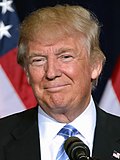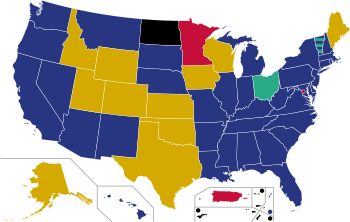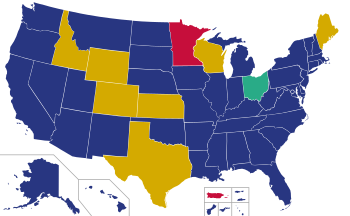
Back Respublikaçılar Partiyasının prezident seçkiləri üçün praymeyrzi (2016) Azerbaijani Primarias presidenciales del Partido Republicano de 2016 Spanish رقابتهای مقدماتی ریاست جمهوری حزب جمهوریخواه (۲۰۱۶) Persian Yhdysvaltain republikaanisen puolueen esivaalit 2016 Finnish Primaires présidentielles du Parti républicain américain de 2016 French Elezioni primarie del Partito Repubblicano del 2016 (Stati Uniti d'America) Italian 2016年アメリカ合衆国大統領共和党予備選挙 Japanese 2016년 미국 대통령 선거 공화당 후보 경선 Korean २०१६ रिपब्लिकन पक्ष प्राथमिक निवडणूक Marathi Uitslagen van de Republikeinse presidentiële voorverkiezingen 2016 Dutch
| |||||||||||||||||||||||||||||||||||||||||||||||
2,472 delegates to the Republican National Convention 1,237 delegate votes needed to win | |||||||||||||||||||||||||||||||||||||||||||||||
|---|---|---|---|---|---|---|---|---|---|---|---|---|---|---|---|---|---|---|---|---|---|---|---|---|---|---|---|---|---|---|---|---|---|---|---|---|---|---|---|---|---|---|---|---|---|---|---|
| |||||||||||||||||||||||||||||||||||||||||||||||
| |||||||||||||||||||||||||||||||||||||||||||||||
| |||||||||||||||||||||||||||||||||||||||||||||||
2016 U.S. presidential election | |
|---|---|
| Republican Party | |
| Democratic Party | |
| Third parties | |
| Related races | |
| |
Presidential primaries and caucuses of the Republican Party took place within all 50 U.S. states, the District of Columbia, and five U.S. territories between February 1 and June 7, 2016. These elections selected the 2,472 delegates that were sent to the Republican National Convention. Businessman and reality television personality Donald Trump won the Republican nomination for president of the United States.
A total of 17 major candidates entered the race. Prior to the 2020 Democratic Party presidential primaries, this was the largest presidential primary field for any political party in American history.[2] From early in the primary season, the race was characterized as a wide and diverse contest with no clear frontrunner. Early polling leaders included former Florida Governor Jeb Bush and Wisconsin Governor Scott Walker, among others. The race was disrupted by the unexpected entry of Trump in June 2015, who quickly rose to lead polls for the rest of the primary season, with the exception of a period in the fall when neurosurgeon Ben Carson experienced a surge in support.
U.S. Senator Ted Cruz of Texas won the Iowa caucuses, while Trump won the New Hampshire and South Carolina primaries as well as the Nevada caucuses. On Super Tuesday, Trump and Cruz traded states with Trump receiving the plurality of the day's delegates. From March 16 to May 3, only three candidates remained in the race: Trump, Cruz, and Ohio Governor John Kasich. Cruz won four Western contests and won in Wisconsin, keeping open a credible path to denying Trump the nomination on first ballot with 1,237 delegates. Trump scored landslide victories in New York and five northeastern states in April, before taking every delegate in the Indiana primary on May 3. Without any further chances of forcing a contested convention, Cruz suspended his campaign.[3] Trump was declared the presumptive Republican nominee by Republican National Committee chairman Reince Priebus on May 3.[4] Kasich ended his campaign the following day.[5] After winning the Washington primary and gaining support from unbound North Dakota delegates on May 26,[6] Trump passed the threshold of 1,237 delegates required to guarantee his nomination.[7] By the end of the primary voting process, Trump had a commanding lead in the number of pledged delegates, ensuring a very smooth process for being declared the nominee. Trump received over 14 million votes, the most for any candidate in Republican primary history.[8] However, at 44.95%, Trump had the lowest percentage of the popular primary vote for a major party nominee since the 1988 Democratic Party presidential primaries.
On July 19, 2016, Trump and his running mate, Indiana Governor Mike Pence, were officially nominated as the Republican presidential and vice presidential candidates at the Republican National Convention.[9] Trump and Pence defeated the Democratic ticket of Hillary Clinton and Tim Kaine in the general election on November 8, 2016, despite the Democratic ticket consistently leading in polls.[10][11]
- ^ a b c d e f g h Berg-Andersson, Richard E. "Republican Convention". The Green Papers. Retrieved August 10, 2016.
- ^ Linshi, Jack. "More People Are Running for Presidential Nomination Than Ever". Time. Retrieved February 14, 2016.
- ^ Rosenfeld, Everett (May 4, 2016). "Ted Cruz suspends presidential campaign". CNBC. Retrieved May 4, 2016.
- ^ @Reince (May 4, 2016). ".@realDonaldTrump will be presumptive @GOP nominee, we all need to unite and focus on defeating @HillaryClinton #NeverClinton" (Tweet) – via Twitter.
- ^ Kaplan, Thomas (May 4, 2016). "John Kasich Drops Out of Presidential Race". The New York Times. ISSN 0362-4331. Retrieved May 4, 2016.
- ^ Cite error: The named reference
ap-1237was invoked but never defined (see the help page). - ^ Ohlemacher, Stephen; Colvin, Jill (May 26, 2016). "With GOP nomination locked up, Trump goes hard after Clinton". MSN. Associated Press. Archived from the original on May 27, 2016.
- ^ Will Doran (July 8, 2016). "Donald Trump set the record for the most GOP primary votes ever. But that's not his only record". Politifact.
- ^ "It's Official: Trump Wins GOP Presidential Nomination". NBC News. July 20, 2016.
- ^ "Trump defeats Clinton in US presidential race". ABC News. November 9, 2016.
- ^ "General election: Trump vs. Clinton". RealClear Politics. Retrieved February 2, 2023.
© MMXXIII Rich X Search. We shall prevail. All rights reserved. Rich X Search






